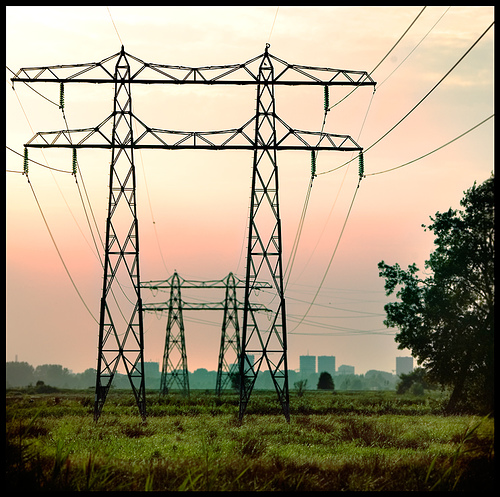
This blog is part of a series of contributions documenting time spent in southern Nigeria to attend a conference and gather data for the targeting energy infrastructure (TEI) project.
In Nigeria, people celebrate when the lights come on. Admittedly, after barely a week in the country I too found myself joining in the collective, nationwide jubilee. The regular power outages throughout the country have created an emotional rollercoaster, whereby the mere act of sitting in a dark room that is at one moment illuminated by nothing more than a few flashlights (most of which are from mobile phones) and then at another buzzing with electricity. It’s nothing short of thrilling.
Yet the thrill soon dissipates in exchange for bewilderment. How can one of the top oil and gas producers in the world be short of energy to power its economy? Unfortunately, the irony doesn’t stop there. While millions of barrels of sweet, easily refined crude oil are shipped out of here daily to feed other economies, domestic fuel shortages have been a common feature in Nigeria. Years of militancy and criminal exploitation aimed at the oil and gas infrastructure in the energy-rich Niger Delta region mean there has been no development of new infrastructure, and overall mismanagement has limited the amount of supplies needed to feed domestic consumption. It wasn’t until last month that the Nigerian National Petroleum Corporation (NNPC) announced that fuel supplies exceeded national daily consumption rates for the first time in months. Accustomed to such scarcity, I found that most people frequently note when they see a station with short lines.
But the Nigerian civil society (and I would go further, to say African civil society) are extremely powerful, resourceful and innovative. What the state doesn’t provide, the community finds a way to supply. In the case of the energy shortages, Nigerians manage considerably well. For instance, the lively cyber café in Warri (which has become somewhat of a second home for me) is being powered by a generator as I scribble this blog. The actual power went off a long time ago. In fact, stepping outside one finds that the traffic noise is almost overwhelmed by the sounds of generators humming from most businesses.
As for fuel shortages, well, Nigerians are natural entrepreneurs. Long waiting lines fueled by scarcity have opened the doors to new ‘fuel markets’ created and managed by the community. Roads are lined with street vendors that sell fuel purchased at gas stations for a profit, providing travelers with quick alternative solutions. It’s not uncommon then to see people parked along the side of the road, pouring fuel into their car that was purchased on the street. Black-market fuel is also widely available; it typically consists of stolen crude refined at an illicit facility in the region. In addition, while attending a meeting hosted by the Niger Delta University in Yenagoa, I met some people at the Wetlands Centre who work with The Sungas Project – an effort that aims to develop community-oriented, renewable energy projects in the Niger Delta.
This is not to say that all is rosy. Quite the contrary. Business moves much more slowly here, and part of that is due to the constant flux between power failures and weaknesses throughout the national energy infrastructure. The power supply’s unreliability is distracting and limiting. As a researcher, I have found it difficult to even jot down a quick blog and post – something that comes with such ease when I am in my office in Zurich.
Despite this, ‘resiliance’ comes to mind when I think about Nigerian society. In the face of an unreliable, centralized power source, people have shown the willingness and capability to develop independent solutions born at the grassroots level. This leads me to believe that more efforts should be provided to support a Nigerian civil society, who is more than capable of developing decentralized, sustainable energy technology. Who knows. If given the opportunity and investment, they may just revolutionize how people around the globe power their communities at the local level.


One reply on “Electricity in Nigeria: (Sort of) Off and On”
See also the recent publication on nuclear energy in Nigeria by CIGI.